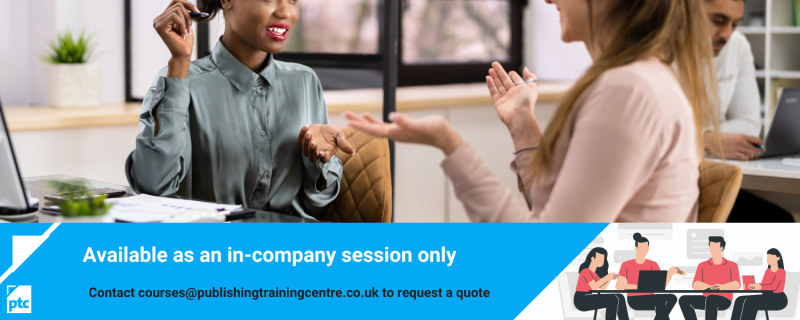
How to book
Please contact us at courses@publishing trainingcentre.co.uk to request an in-company quote
Course format
In-person only, 1 full working day, including breaks
The relationship between author and editor is critical for any publication’s success. Working with Authors is one of the most challenging – and rewarding – aspects of publishing life. Not all authors are the same, and some require more support or encouragement than others.
This interactive, day-long workshop covers collaborating with, and getting the most out of, your authors. From new, inexperienced writers who are going through the publishing process for the first time, to more established (and perhaps intransigent) authors, this course will consider them all. It will provide you with advice and guidance on how to make the editing process as smooth as possible, from when an author is signed up to seeing their book in print – and beyond.
Please note that this course is suitable for those working in non-fiction, ideally academic, educational, professional and/or reference publishing.
Who is it for?
Anyone who has direct contact with authors during the production of their work and needs to have good working relations with them, or anyone moving into a role working with authors for the first time. This includes:
- assistant editors
- commissioning editors
- desk editors
- development editors
- editorial assistants
- managing editors
- publishers
- publishing directors.
What will you achieve?
On completing this course, you’ll be able to:
- make communication effective and efficient
- help authors deliver good content on time
- tailor feedback so that it is constructive and well received
- make working with authors of all kinds rewarding rather than stressful
- exercise better judgement on what to let go, when to take charge, and when to be flexible.
Programme
Session 1: Getting the best from your authors
- What motivates your authors?
- How can you handle those motivations to help them meet your objectives throughout?
- What does your author need? New authors, experienced authors, busy authors
Session 2: Managing expectations and different communication styles
- Pros and cons of different tools of communication
- Managing author expectations and dealing with different personalities
- The author journey: effective communication at each stage
Session 3: Managing the process
- Giving good feedback: general principles
- Editorial judgements: ‘silent’ edits; edit and explain; actual queries or proposals
Session 4: Resolving problems
- Dealing with common challenges: the tardy author, the unresponsive author, the unreceptive or ‘difficult’ author
- Managing a team of authors
- Proof-stage problems
Session 5: Maintaining a good relationship
- Working with other departments
- After publication: retaining good authors
How the course is delivered
The course is delivered as a 1-day workshop, in person, on the company’s premises, customised to meet the company’s training objectives, and using texts appropriate to its publishing programme or based on its materials. You will learn through working a range of specially prepared exercises, small-group and plenary discussion, and question-and-answer sessions, guided and supported by the tutor. You will receive a course outline and timetable at the start of the course, with discussion exercises listed. After the course you will be sent the slides, updated to include key points from group discussions.
Any information to be completed beforehand will be sent via email.
Accessibility
Please contact us at with any accessibility or special requirements, for example having in-session captions or the learning materials sent to you in advance.
If you have any concerns about technical requirements or access please contact us on or telephone +44 (0)20 8874 2718.
In-company training
This course is also available for in-company training, either virtually or in person at your office. Course content is tailored to suit your requirements. Group sizes range from 5 to 12 attendees. To find out more, email or telephone +44 (0)20 8874 2718.
Delegate feedback
About the tutor(s)

In an in-house career that took her to Berlin, London, Oxford and Cambridge, Caroline Drake worked on a wide range of academic books, journals and illustrated trade titles. She was trained at Blackwell and Cambridge University Press, where, as senior subeditor then copy-editorial manager, she in turn trained copy-editors and proofreaders for 15 years. She updated Butcher’s Copy-editing, with a colleague, for the fourth edition.
Now freelance, Caroline enjoys helping authors to get things right, first time. She has created and taught courses for a variety of clients, including publishers, educational organisations, the Chartered Institute of Editing and Proofreading and the Parliamentary Research Service at the House of Commons.
Related courses
The PTC offers virtual classroom courses, self-study distance-learning courses, and a range of e-learning modules. See below for those that complement or build on this course.
Virtual Classroom Courses
- Advanced Copy-Editing
- Advanced Proofreading
- Applying AI – Tools, Ethics and First Practical Steps
- Copyright – the Basics
- Developing Effective Management Skills in Publishing
- Editorial Project Management
- Grammar and Punctuation – the Basics
- Introduction to Editorial Skills: Copy-Editing and Proofreading
- Line Editing Workshop (Fiction or Non-Fiction)
- Making Sense of Grammar
- Making Sense of Punctuation
- Negotiating for a Win-Win Outcome
- Progress in Editorial Skills: Copy-Editing and Proofreading
- Publishing Strategy Toolkit
- Rewriting and Substantive Editing
- The Fundamentals of Public Speaking
e-Learning Modules
- A Commissioning Editor’s Guide to Working with Authors
- A Comprehensive Guide to Copy-Editing
- A Copy-Editor's Guide to Working with Authors
- An Editor's Guide to Author Queries
- An Editor's Guide to Editing Fiction
- An Editor's Guide to Editing Illustrations
- An Editor's Guide to Editing References
- An Editor's Guide to Editorial Style
- Essential Copyright for Publishers
- Essential Editorial Project Management
- Proofreading PDFs: A Complete Guide for Editors